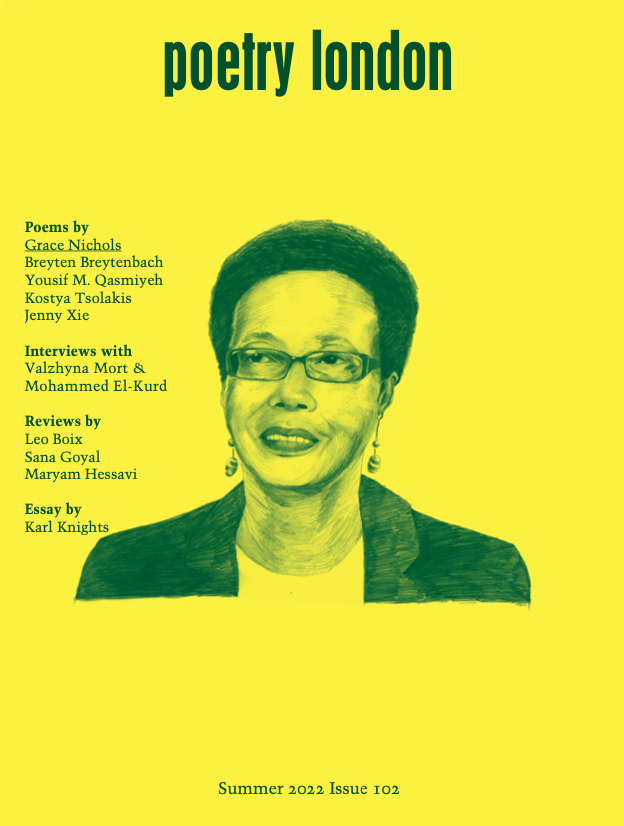‘Whose House Is It Anyway?’
André Naffis-Sahely
“As institutions and festivals big and small have begun to return to solely in-person events, my enthusiasm for poetry itself began to wane” the poet and critic Karl Knights confesses in our Summer issue’s featured essay, ‘No Disabled People Wanted Here: Accessing The Estate of Poetry’, which riffs on Czesław Miłosz’s idea that poets “participate in the management of the estate of poetry.” Nevertheless, Miłosz’s metaphor inevitably begs the question of who among us is actually allowed to draw from the benefits of that estate. Knights continues: “When we roam around ‘the estate of poetry’, what do you encounter? Are the walls high and the gates locked? Is there an enormous flight of steep stairs with no lift in sight? Who is inside the estate, and who is waiting outside the walls, waiting to be let in? […] An inaccessible space says, ‘This space is not for you. We don’t want your presence. We don’t want your words.’” A sad reality that disabled poets, as Knights reminds us, have been dealing with since time immemorial, an even more galling state of affairs than usual these days when many arts organizations throw the word ‘accessibility’ around in the same tokenistic manner they do ‘diversity’, hoping to quash these vital conversations by coopting the language of inclusivity to better camouflage their tired old practices. Knight’s essay nonetheless retains a positive outlook, urging us – all of us – to make good on our promises and deliver an alternative vision and set of practices that might finally lead us away from the murderous, exploitative, exclusivist ‘normal’ that so many of us appear in such a hurry to restore after more than two years of disease and devastation.
The experience of living in dark times demands that we seek light wherever we can, and the poems in this issue, saturated with summer, will, we hope, delight our loyal readers with a healthy dose of that much-needed warmth, whether we’re reading Aoife Lyall’s ‘Wildflowers’, dedicated to her husband, where she writes, “we do not know if they will grow, or what is weed or flower, or when / to give them water or how they will survive”, or the words of Harriet Jae and Matthew Zapruder, which we wager will fill your nostrils with the sea-salt as soon as your eyes begin to scan their thoughtful poems. Of course, as those familiar with our most recent issues might suspect, we wanted the light emanated by these poems to shine on issues dear to our hearts and minds. Herman Hesse’s poem, ‘For the Children’, here translated by Wally Swist, was composed towards the end of 1914, by which time many in Europe, as well as in many other parts of the world, had begun to understand that the World War born that summer would likely last for years, and not mere months as had first been assumed, and it forges an eerie connection to our present and its normalization of perpetual war – not just in Ukraine, as much of the Western media would have us believe – but also in Afghanistan, Ethiopia, Myanmar, the Sahel, Yemen. In Fred D’Aguiar’s ‘Haikus for Arthur Scargill & Bill Morris’, the acclaimed poet, a treasured, longtime contributor to these pages, reminisces about his early years in London, when he and his friends would sell copies of Socialist Worker in Lewisham – where PL is now based – only to be thrown “into the back of a Black Mariah” on his way home “after the demo”, while Kostya Tsolakis’s ‘The Dead of the Greek Enclosure in West Norwood Cemetery Speak to Me’, one of this issue’s stand-out poems, sees the author and editor wander those grounds surrounded by “Orthodox names, / tough meat for English mouths” with his “homeland buried in [his] teeth” as he considers what home and identity mean to him after more than half a lifetime in this country. In closing, we hope many of you will join us for this issue’s launch, which will be held on the evening of Saturday 25 June at our new permanent home at the Southbank Centre, in collaboration with the National Poetry Library, an event that will be live-streamed through our YouTube channel, in keeping with our new policy of (trying to) ensure that ‘the estate of poetry’ is actually accessible to us all. Imagine that.


